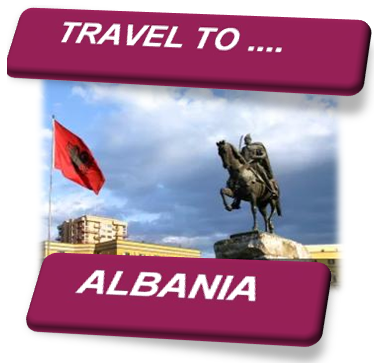3:45 PM Country info Albania |
Albania
The country currently has a population of around 3.5 million. After decades of turbulent government, Albania rebelled against almost 50 years of communist rule in the early 1990s and is now an emerging democracy. Due to its chequered history, Albania is still relatively undiscovered as a tourist destination. There is a fascinating mixture of influences and cultures as well as stunning scenery and a range of outdoor activities.
Climate
Around the coast, the climate is Mediterranean. Winters are mild in the lowlands, with temperatures of around 7oC. In the summer, temperatures average 24oC (lower in the south) and humidity can be uncomfortably high. Average rainfall is heavy and higher in the north. Things to do and see Albania's long history and varied relationships with other countries have left some fascinating material behind – Greek, Roman, Byzantine, Venetian, Ottoman and more. In the south of the country near to the Greek border, Butrint is the largest archaeological site in Albania. It is a UNESCO World Heritage site and has remains stretching from the Bronze Age through to the Ottoman period. There are a number of opportunities for hiking in Albania. The Tomorri Mountain Ridge in the south offers wild scenery and the Bektash (an order of Islamic mysticism) monastery at the top. Dhermi, on the south-western coast between Vlore and Saranda, has one of the best beaches in the country and is great for camping. Travel Mother Teresa International Airport (Albania's only international airport) is located 16 miles north-west of the capital city of Tirana. Taxis are available throughout the day and night to shuttle you into the city centre for around 25 Euros. The airport is served by a number of airlines, including British Airways from London Gatwick. It is not possible to enter the country by train, as there are no connections. Coaches travel to Tirana from Istanbul (Turkey), Athens (Greece), Sofia (Bulgaria) and Tetovo (Macedonia). Ferries serve several ports, including Durres from the Italian ports of Ancona, Bari, Brindisi and Trieste. If you are entering by car, you will be issued with a certificate which you will need again to leave, as well as paying a charge of two Euros per day. Drivers can be aggressive and unpredictable (and possibly armed). Roads can be very poor, particularly in rural areas. Look out for potholes and don't expect streets to be lit. Take all spares and repair equipment with you as there is no national recovery service. Within the country, most people travel by furgons, private minibuses which go to destinations around the country. There is no set timetable and the drivers simply leave when they have enough passengers. Train services are limited and the trains themselves can be very basic. A list of hotels in Tirana can be found on the embassy website. A list of youth hostels in the country's major cities can be found here.
Health care issues Make sure you have valid medical insurance and a dated letter from your GP detailing any relevant conditions. Any medication you take should be clearly labelled. Doctors and hospitals will expect payment in cash. Medical care is rudimentary and many essential supplies may not be available. You will need a number of vaccinations before leaving for Albania. Everyone should be inoculated against Hepatitis A as well as having a current Tetanus-diptheria vaccination and Measles, Mumps and Rubella for those born after 1956. If you are planning to travel widely and eat anywhere other than major hotels and restaurants, Typhoid and Hepatitis B inoculation are recommended. Water is not safe to drink unless it has been boiled or otherwise purified. Fruit and vegetables should be peeled and cooked before eating and it is probably best to avoid food sold by street vendors. The northeast of the country can be dangerous, with land mines and armed gangs around the Kosovan border. Travellers are advised to avoid this region altogether. |
|
|
| Total comments: 0 | |

 Albania is a Balkan
Albania is a Balkan Despite being a relatively small area of land,
Despite being a relatively small area of land,